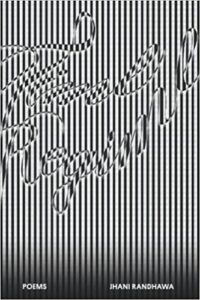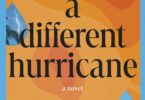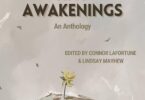 Reviewed by Manahil Bandukwala
Reviewed by Manahil Bandukwala
Jhani Randhawa, Time Regime (Gaudy Boy LLC, 2022), 144 pp., $16 US.
Jhani Randhawa’s debut poetry collection Time Regime is, as the title hints, a slow meander through time. This is evident from the very first poem of the collection, “Primavera,” in which Randhawa writes: “as your dream folks inchoate hours and cascades over the glaciers— / I stop, blunted by an unfastened boom.” Time Regime as a whole embodies this kind of movement, most strikingly through language.
Randhawa maximizes the feeling of motion through the tension between flowing lyric poems and prose poems. This makes phrases such as “machine irradiated and mollusk-pocked… / machine of care programtouch” stand out. The first poem closes with the lines, “how certain are you that this is speculative? / That dreams are not already gathered about you, watching?” The question these lines pose opens the book’s journey to the reader — how do we engage with the abstract and sensory language of the collection? How do we know this language is not already inside us?
The collection is laid out in five numbered but unnamed sections. In “Mechanics,” which is in the first section, Randhawa describes ideas of translation and spirits, writing: “I am wandering from spirit city where listening was once sacred, / silence, a power, too. To burrow deep, seeking the origins of sound // I walk by a refraction and become the prism” (18). Again and again, Randhawa offers lines that emphasize the way poetry is a mutual act. Here, poetry exists outside of the page as the splitting of light becomes as much of a poem as the silence of a spirit city. The reader is trusted with what is unsaid, which makes the lines linger the way spirits do.
“Scriation” shifts into a long prose poem sequence, in which we see Randhawa’s skill with language emerge in a different poetic form, the way “green was the language of intermediaries, and blue—evading place or representative origin—was ‘nothing of very little, it was even absent from the sky.’” Colours have their own language too, a language different from what we might expect to encounter based on the world around us. Coming back to the notion of silence, Randhawa determines “there is not enough silence left to defend life. It is bad faith to consider your life an exception.”
Randhawa’s language feels ethereal in a way that has me reading and rereading lines. For example, in the third section, the poem “Humming Fields” closes with the lines: “A radial glint off their backs. Becoming the star. Unlike the rest, the sun mines for itself in the atmosphere to incubate beauty.” Their poetic diction is captivating. In a later section of the same poem, they write, “The blurry figures move across the bridge that demarcates I and the seen, fingers taut, preparing to launch us into the swell, and the language of mist unravels its saturnine summit, and into the cavernous rush go— // indiscriminate and unsophisticated as this letter.” Here, even the intangible is given a language, a form of communication that is made visible through a rush of movement.
The fourth section opens with the poem, “Estuary: A Video of Couches Foregrounded by Squats, Dances, and Bells” — a poem that is full of relatable lines such as “imagine it was you in a room, trying to think // about anything but the / algorithm.” Although Randhawa’s language is at times abstract in the way any poetry reflecting on the very nature of language is, lines like this ground their work and demonstrate the context from which their linguistic reflections occur. In the same poem, Randhawa writes “let me be reclaimed here, / in my prose project” (78) — the prose project being the imaginative prose-poem worlds that Randhawa whisks us away into “at protest’s pace, the mountain rising out / the window // assuming there is a window” (80).
Immediately following “Estuary” is a prose poem, “Scriation II: Recrystallize,” that reflects on passages of time and language, but are reframed in the context of the previous poem. In these striking lines, Randhawa writes: “And I have not braided a friend’s hair in years. Unbinding—window; binding—our hands meet in my pocket. Cords skitter from strands between fingers, and my knees are steadied under her arms, ribbon shelter of her chest—the years between footfalls, over and under.” Here, language and time are braided with love and memory. The window returns, and with it the implication that the presence of the window is assumed rather than a fact. A lot of reflections on language is a matter of filling in the blanks of the unsaid. In Time Regime, Randhawa does exactly that. By iterating on ideas and thoughts, questions find their answers: “You are and deserve more than this composite,” writes Randhawa.
In the fifth and final section, they state, “We’re experimenting with reshaping our relation to the universe,” which speaks more broadly of the themes of the collection as a whole. If time is a regime, then “That reading is as much against the police as it is toward what it takes to just breathe in.” Amidst this regime swells the theme of rising up, as articulated in the second-to-last poem “Gradient Becoming the Wound / the Wound Itself,” where Randhawa closes the poem with the line, “when you were the mountain in the mildness of this.”
Time Regime begins with a sense of movement that mimics that of a river, but by the collection’s last poems, this movement is vertical, mountainous. The switches between prose and sparse lyric allow this motion to come through not just in the language but in the pacing and therefore overall impact the collection leaves. Randhawa’s poetry excavates a poetic language already within us, a language that rearranges the familiar and situates us just slightly apart from where we first began.
…
 Manahil Bandukwala is a visual artist and writer. Her most recent work is a collaborative piece with Liam Burke titled Orbital Cultivation, and is out with Collusion Books in 2021. She is Coordinating Editor for Arc Poetry, and Digital Content Editor for Canthius. She is a member of VII, an Ottawa-based creative writing collective. Her debut poetry collection, Monument, was published with Brick Books in 2022. See her work at manahilbandukwala.com.
Manahil Bandukwala is a visual artist and writer. Her most recent work is a collaborative piece with Liam Burke titled Orbital Cultivation, and is out with Collusion Books in 2021. She is Coordinating Editor for Arc Poetry, and Digital Content Editor for Canthius. She is a member of VII, an Ottawa-based creative writing collective. Her debut poetry collection, Monument, was published with Brick Books in 2022. See her work at manahilbandukwala.com.






